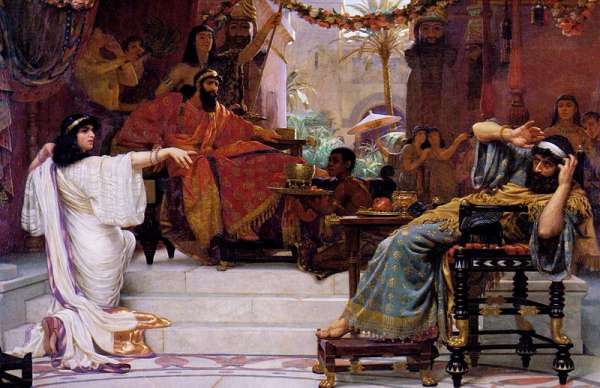By Sajeeb Sarker
Erotic Capital
Media School July 26, 2020

Queen Esther exploiting her erotic capital to save the Jews from genocide. Ernest Normand (1888).
Erotic Capital refers to the bodily attributes of a person that are typically considered, or even accepted, as erotic (e.g. beauty, 'attractive body shape and structure' etc.). Such bodily features are considered as 'capital' from the perspective that these features can achieve higher recognition, or value, or extra benefits of varied sorts for a person apparently having those than a person who apparently lacks those. This is why, erotic capital is also substituted as 'Sexual Capital'.
Theoretically, according to the Collins English Dictionary published by the HarperCollins Publishers, ‘Erotic Capital’ is ‘the influence and earning power a person has as a result of his or her sexual attractiveness’. Wikipedia describes erotic capital or sexual capital as "the social value an individual or group accrues, as a result of their sexual attractiveness". According to this very source, as with other forms of capital, 'sexual capital is convertible, and may be useful in acquiring other forms of capital, including social capital and economic capital'. In essence, erotic capital, presently, is being translated and/or used to describe the use of erotic elements (i.e. beauty, human body) as ‘investment’ to gain something (often ‘extra benefits’) that cannot be achieved without that ‘investment’ thus making those elements ‘capitals’.
Conventionally, women are believed to have more erotic/sexual capital than their male counterparts.
Erotic Capital, or Sexual Capital, is comparatively a newer concept in the feminist discourse. Incepted around two decades ago, it has become a matter of great concern among the feminist theorist and activists along with sociologists. While the pioneering authors of this term argue that each and all human being possess erotic or sexual capital in differing extents and people – especially the ones with less or no intellectual capabilities – should use it to make advancements within the given society.This concept of erotic capital has been controversial since its inception. As this concept clearly makes a division between ‘beautiful’ and ‘ugly’ people, or 'attractive' and 'less attractive or not attractive' people, or even sexist definitions like 'sexy' and 'not sexy' - often considered as a male chauvinist concept, it has been opposed by feminist theorists and activists. Besides, advocacy in favor of using erotic/sexual capital for economic and social progress (development) encourages sexual behavior that are unjustifiable, and violation of someone’s dignity – to many feminists’ understanding.
Useful readings
Green, Adam Isaiah (2008). The Social Organization of Desire: The Sexual Fields Approach. Sociological Theory. Philadelphia, PA: American Sociological Association. 26: 25–50. doi: 10.1111/j.1467-9558.2008.00317.x.
Green, Adam Isaiah (2014). Sexual Fields: Toward a Sociology of Collective Sexual Life. University of Chicago Press.
Green, Adam Isaiah (1 January 2013). ‘Erotic capital’ and the power of desirability: Why 'honey money' is a bad collective strategy for remedying gender inequality. Sexualities. ISSN: 1363-4607.
Hakim, Catherine (2010). Erotic Capital. European Sociological Review. 26 (5): 499–518. doi: 10.1093/esr/jcq014.
Hakim, Catherine (2010). Have you got erotic capital? Prospect Magazine (April 2010). Accessed on 18 November 2019.
Hakim, Catherine (2011). Erotic Capital: The Power of Attraction in the Boardroom and the Bedroom. Basic Books. pp. 16–18. ISBN: 0465027474. ISBN13: 9780465027477.
Hamermesh, Daniel S (2011). Beauty Pays: Why Attractive People Are More Successful. Princeton University Press. ISBN: 0691140464. ISBN13: 9780691140469.
Martin, John Levi & George, Matt (2006). Theories of Sexual Stratification: Toward an Analytics of the Sexual Field and a Theory of Sexual Capital. Sociological Theory. 24 (2): 107–132. doi: 10.1111/j.0735-2751.2006.00284.x.
Michael, Robert T. (2004). Sexual Capital: An extension of Grossman’s concept of health capital. Journal of Health Economics. 23 (4): 643–652. doi: 10.1016/j.jhealeco.2004.04.003. PMID 15587691.
Rhode, Deborah L (2010). The Beauty Bias: The Injustice of Appearance in Life and Law. Oxford University Press, USA. ISBN: 0195372875, ISBN13: 9780195372878.


